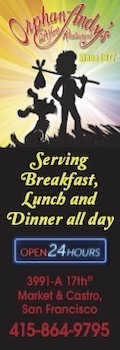We Have Always Been
In the first half of the 20th century, the North Beach neighborhood was a major hub of LGBTQ and bohemian life, including bars, restaurants, and other social spaces. Venues like Mona’s 440 hosted regular gender-bending performances and were a draw for locals and tourists alike. Performers included everyone from local drag kings and queens (or male and female impersonators, to use the language of the time), to nationally renowned singers like Gladys Bentley, who started out during the Harlem Renaissance and became one of the most recognizable blues singers in the country.

Many LGBTQ nightlife spaces, both in San Francisco and around the U.S., were shut down in the 1950s and 1960s during a period of cultural repression. This was one of several periods over the last two centuries in which anti-LGBTQ groups have used fear and misdirection to try to erase LGBTQ people from the landscape. In San Francisco, these efforts go as far back as 1863, when the city passed a law that prohibited cross-dressing (in the language of the time), one of more than 30 cities to pass similar laws around the same period. The San Francisco law was enforced until as recently as 1974.

Today, yet another group of misguided activists seek to erase our history and curtail our right to occupy space. That is why showcasing the long history of drag and gender bending performers—especially during times of repression—is so important. We highlight these stories to provide the direct evidence that we have always been here. And we always will.
These photos are from one of the more than 1,000 individual archival collections held by the GLBT Historical Society that reveal a vast array of LGBTQ life, history, and culture. From drag outfits and massive flags, to deeply personal diaries and correspondence, to organizational records, historic bar signs, ephemera, and more, our archival holdings make up one of the largest collections of LGBTQ historical materials ever assembled. We share our collection highlights at our museum, located at 4127 18th Street in the Castro district. Our archives, located downtown at 989 Market Street, are open by appointment to anyone interested in diving deeper into queer history. To book your visit, or to make a contribution to support the organization’s work, visit https://www.glbthistory.org/

The GLBT Historical Society maintains a strong commitment to documenting the diverse lives of LGBTQ communities and is especially interested in receiving and preserving archival collections that focus on the intersectional experiences of women, people of color, transgender and nonbinary people. If you have materials that fit our mission and are interested in donating them, please consider contacting our archives staff at reference@glbthistory.org
Community Treasures from the GLBT Historical Society Archives
Published on April 6, 2023








Recent Comments